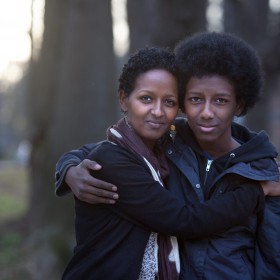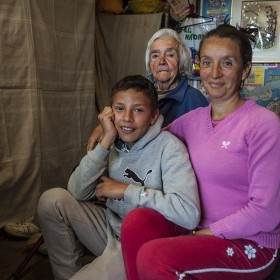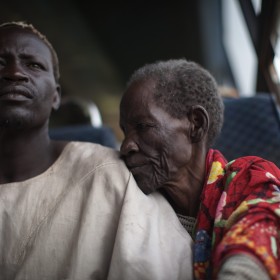Emmanuel’s Story, Ivory Coast

Photo by Emmanuel Koffa/2014
When Liberia descended into war on the eve of Christmas 1989, violent fighting between Charles Taylors’ rebels and President Samuel Doe’s army forced Emmanuel, who was a student in the town of Zwedru (Grand Gedeh, western Liberia) to flee to his village of Krllepo Kanweaken.
“I wanted to become a journalist and so I practiced my skills at the local station, reporting the news on the ‘Saturday Special’ show and broadcasting messages to encourage people to resist the rebels. I loved it and was very sad to leave, but I knew that I did not have a choice when I saw soldiers carrying bodies to the hospital near school. I was so afraid, so I retreated to my hometown and joined my parents”.
He was not safe for long, though. In August 1990, Charles Taylor’s so-called “freedom fighters” reached his village and attacked at dawn, while everyone was still sleeping.
“They killed my uncle, who was the town chief, my father, the paramount chief, and my older brother because their ID cards showed that they were associated with the National Democratic Party. My mother was also killed. Today, only two of us survived; my little brother, who was traumatized by what he witnessed, and myself”.
Emmanuel fled into the bush and lived there for three years, surviving on cassava, bamboo shoots, and creek water. Women from the village secretly brought him matches from the market so that he could build fires and cook food. He was shoe-less for two years, until someone who was also living in exile brought him a pair – from a place called “Cote d’Ivoire”, which he knew nothing about.
“I had never thought about leaving Liberia, but as more and more Liberians fled the country, I decided to do the same. It was just too dangerous to stay. I crossed the border on 12 June 1993 and settled in the town of Tabou, in the west. My little brother joined me in 1999 and received medical help from UNHCR, Caritas, and a Swiss doctor. He is still struggling, but no longer has nightmares like he did before. Life was not easy in Tabou: there were so many refugees, and I lived with a large extended family, there was not enough food, and I was always hungry. When I would go into the forest to cut wood, the locals would chase me with cutlasses, accusing me of stealing from them. I was just trying to survive. Thank God I did”.
Despite finishing his degree in accounting and landing a good job as a teaching assistant at a local school, Emmanuel had to flee again in 2001 when Taylor’s rebels launched incursions across the border in Tabou. He now lives in Abidjan with his wife, and is the head of the Liberian refugee community. Days like World Refugee Day remind him of his difficult past – of everything that he has left behind – but are also cause for celebration:
“Uniting and joining forces with so many other refugees on a day like this makes almost feels like being home.”









